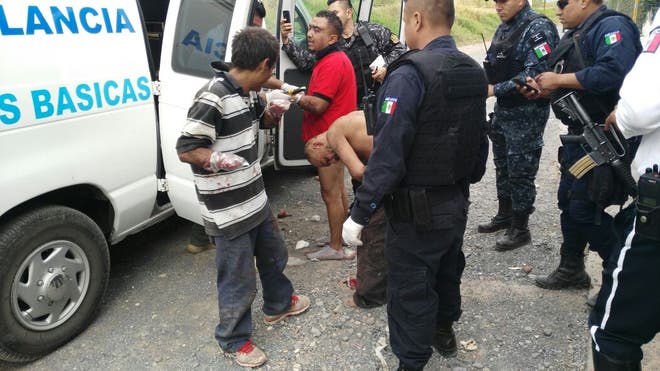Vigilantes chop off the hands of six alleged crimi
Post# of 52061
Guadalajara, MEXICO – Six alleged criminals were found alive with their hands chopped off after an apparent vigilante attack in the outskirts of Guadalajara, Mexico’s second biggest city, on Monday afternoon.
Authorities in the western state of Jalisco confirmed that five men men in their 30’s and a 44-year-old woman were being treated for amputations in local hospitals after they were discovered at about 6pm in Guadalajara’s Tlaquepaque district. The woman’s partner, a 39-year-old male, was found dead at the scene.
Graphic images circulating on social media showed several bloodied men with their hands hacked off at the wrists. Some had the words “I’m a rat” tattooed on their foreheads. Their severed hands were dumped in two plastic bags that lay beside them.
A handwritten banner left at the crime scene accused the victims of disrespecting women and children, breaking into people’s homes and stealing vehicles, jewelry and cell phones, among other alleged crimes. It was signed by the “Elite anti-rat group”. Thieves and petty criminals are commonly known as rats in Mexico.
A Guadalajara police officer, who asked that his name be withheld because he was not authorized to publicly discuss the case, confirmed the authenticity of the images.
The officer told FNL that vigilantism was “a very grave, sensitive issue because it shows that we don’t have an effective justice system, nor municipal or state police forces that are capable of combatting crimes such as theft.”
The Jalisco attorney general, Eduardo Almaguer, revealed in a press conference on Tuesday morning that police had located a safe house in Tlaquepaque and arrested two suspects, including the presumed head of the criminal cell responsible for the amputations.
“They’re criminals and we’re going to arrest them and they will be punished. The state has to punish them,” Almaguer said of those responsible. He played down the idea of vigilantism and described the amputations as part of an internal dispute within the region’s dominant criminal organization, the Jalisco New Generation Cartel (known by its Spanish acronym CJNG).
Almaguer said the victims were kidnapped at midday on Monday on the southern fringes of Guadalajara. They had criminal records for robbery, assault and distribution of drugs but there were no outstanding warrants for their arrest. Initial statements indicated that the mutilations were retribution for their failure to pay for a shipment of drugs, the attorney general added.
“No one can be above the law. Violence cannot be resolved by acts that bring more violence,” said María Elena Limón, the mayor of Tlaquepaque.
The state of Jalisco has been badly hit by drug-related violence in recent years, as the upstart CJNG has rapidly established itself as one of Mexico’s most powerful criminal gangs.
Last year, the cartel was blamed for shooting down an army helicopter and blockading dozens of roads in and around Guadalajara, the state capital, with burning vehicles. The CJNG also stands accused of assassinating dozens of police officers and public officials, including a federal congressman and the Jalisco tourism secretary.
On Monday, Vicente Antonio Bermúdez Zacarías, a federal judge who had been involved in several high-profile cases involving senior CJNG members, was shot dead by unidentified assailants while jogging near his home in the central State of Mexico.
Rampant insecurity has led vigilante groups to spring up across many parts of Mexico in recent years. Yet Jalisco authorities have repeatedly denied the existence of vigilantes in the state, despite media reports of community-organized groups patrolling Guadalajara’s crime-stricken outskirts.
Dr. Francisco Jiménez Reynoso, an expert in security issues from the University of Guadalajara, told FNL the amputations were “a barbaric act that takes us back centuries to what’s known as private vengeance” and “a strong indication that the security issue is getting out of control.”
Acts of vigilante justice tend to occur when there are high levels of crime and impunity, Jiménez noted. Over 99 percent of crimes go unpunished in Mexico, according to the 2016 Global Impunity Index [PDF].
The amputations came on the same day that the state and city governments signed an agreement to create a new metropolitan police force in a bid to restore law and order in Guadalajara. Enrique Alfaro, the Guadalajara mayor, hailed the agreement as “an important step that will enable us to build a model for security.”
The Jalisco governor, Arisóteles Sandoval, said the new body would work with municipal police forces “to reinforce areas where we find high-impact crimes like homicides, kidnappings, drug-trafficking and gasoline theft.”
Jiménez welcomed the prospect of enhanced collaboration between different government and police bodies but voiced skepticism that the new force would solve the city’s problems.
“I think,” he said, “organized crime is always three or four steps ahead of the security forces.”

 (0)
(0) (0)
(0)